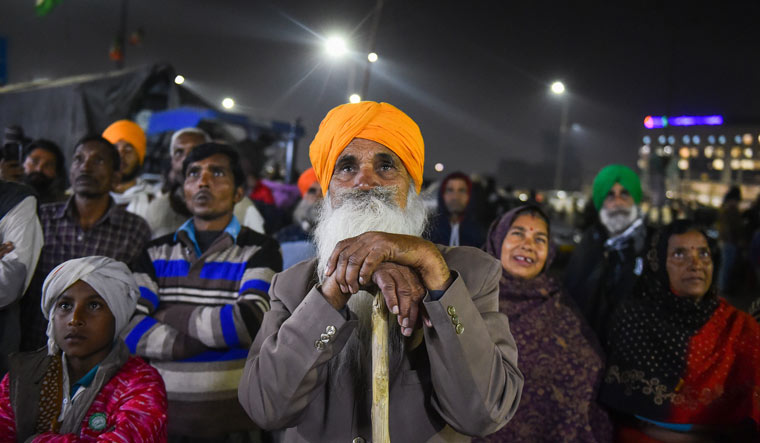Come Summer Or Rain: Protesting Farmers Ready For Monsoons
Jul 14, 2021 | Pratirodh Bureau
FILE PHOTO: Farmers at a protest site at Ghazipur border near New Delhi. Rajendra Chavan (not in photograph) of Barshi tehsil in Solapur said his onion yield fetched a price of Rs 1 per kg at the Solapur market yard and after all the deductions, he received the paltry sum of Rs 2.49 as his net profit (Image: PTI, for representation only)
With metal-reinforced roofs for tents, battery-powered lights and cleaning drives to ensure there is no stagnation of water around their temporary homes, the doughty band of farmers camping at Delhi’s borders are busy getting ready for the monsoons.
Rains spell relief from the sweltering heat but also lead to huge problems, farmer leaders said on Tuesday, as the first monsoon showers fell over the national capital and its surrounding areas.
From keeping ration stocks dry and tackling waterlogging to ward off diseases to preventing electricity-related mishaps and ensuring power supply in case of any outage, the challenges are aplenty at the Singhu, Tikri and Ghazipur sites, where thousands of farmers have been camping for seven months to protest the Centre’s new farm laws.
“It is true the rains will bring us some relief from the heat, but the monsoon has its own set of problems. Tents get uprooted. The rains result in stagnant water, which in turn leads to the breeding of disease-causing mosquitoes,” said farmer leader Avtar Mehma.
One of the first measures to brave the rains was to strengthen the structures that have been their homes.
“We have renovated our tents. The tarpaulin covers have been replaced by more permanent roofs. Plus, a large number of units have been turned into fixed structures with pillars being dug into the ground,” said Lakhbir Singh, another farmer leader.
Mehma added that their simple tents have been transformed into pucca structures with iron roofs.
These structures will protect the protestors as well as their ration stocks from the rains.
“We are trying to ensure that ration is stored in these rooms and kept on elevated surfaces, so it stays protected in case there is waterlogging,” Mehma said.The recent death of a 46-year-old farmer who was electrocuted at the Tikri border has raised anxiety levels.
“We have been managing electricity by joining wires from here and there. Open wires can often cause accidents, so we are trying to get that fixed because chances of accidents will increase in the rains,” Mehma said.
Monsoon rains also bring with them frequent power cuts, even in the best parts of the city, and these temporary townships on highways are no exceptions.
“There is nothing we can do about the frequent power cuts. But we are trying to arrange for emergency lights that use batteries as well as solar lights. We have also installed inverters and generators in a few locations at these protest sites in case of an emergency,” Lakhbir Singh said.
Mehma added that while waterlogging in some areas is unavoidable in this season, volunteers have been deployed to try and stop water from stagnating and to fumigate the protest sites to prevent the breeding of mosquitoes and other insects.
“The governments have not helped us. We have been ensuring cleanliness and sanitation by ourselves right from the beginning,” Mehma said.
They braved the bone-chilling winter, the hot summer and the monsoons are further par for the course, the farmers said.
The Ghazipur border, for instance, where around 4,000 to 5,000 protestors have been camping under the banner of the Bharatiya Kisan Union (BKU) led by Rakesh Tikait, is buzzing with activity.
“We have also informed the farmers who are planning to join the protest here in coming days from their villages to come prepared with facilities for sleeping and cooking on their tractor-trollies during the rains,” said BKU co-media in-charge Saurabh Upadhyay.
The protestors, occupying a road stretch on a flyway on the Delhi-Meerut expressway and under it at the UP Gate, are procuring potable water from Ghaziabad through tankers everyday.
“The local administration has also largely been helpful,” he added.
As they settle in deeper into their protest routine, the farmers say they will not succumb to any pressure, natural or man-made. They are now gearing up for a fresh round of demonstrations outside Parliament through the monsoon session, following which they will be rallying in huge numbers in Uttarakhand and Uttar Pradesh.
The BJP has a stronghold in these two states, which makes the party believe it is powerful in the whole country. Unfortunately, the opposition is not doing its job, so the Samyukta Kisan Morcha (United Farmers Front) has emerged as the opposition.
“We are planning to take out rallies in these two states in September to ensure that the BJP does not win the elections there,” Mehma said.
The farmers have been protesting at Delhi borders against the three farm laws, which they fear will do away with the minimum support price (MSP) system, leaving them at the mercy of big corporations.
Over 10 rounds of talks with the government, which has been projecting the laws as major agricultural reforms, have failed to break the deadlock between the two parties, resulting in the agitation continuing.
